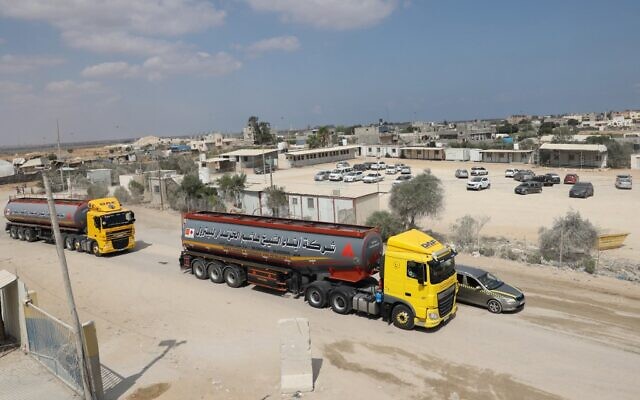Shell-shocked Gazans on Monday sifted through the rubble of three days of deadly conflict between Israel and the Palestinian Islamic Jihad (PIJ) terror group as a truce held and life slowly returned to normal.
An Egypt-brokered ceasefire reached late Sunday ended the intense fighting that killed 45 people, including 15 children, and wounded 360 in the enclave according to Gaza’s health ministry. Israel says some of the deaths, including as many as 12 of the children, were victims of PIJ’s own rockets falling short.
Israel had since Friday launched a heavy aerial and artillery bombardment of Islamic Jihad positions in Gaza, leading the terrorists to fire over a thousand rockets in retaliation, according to the Israeli army.
As relative calm returned to Gaza on Monday and electricity was restored, Palestinians tried to salvage their belongings from the rubble of shattered homes and to start clearing the debris.
“We received the news of the ceasefire with joy and happiness and we went back to our work,” said Gaza shopkeeper Hazem Douima. “We did not want more bloodshed.”
Get The Times of Israel's Daily Edition by email and never miss our top stories
Bereaved families buried their dead, including at one funeral joined by hundreds of mourners in Jabaliya in the northern Gaza Strip where a family laid to rest four minors killed in the conflict.
“Gaza is tending to its wounds,” said one resident, Mohammed Alai.
A senior Israeli diplomatic official, speaking on condition of anonymity, said that “most of the civilians who were killed in Gaza were killed by Islamic Jihad rockets” that fell short or misfired.

A fuel truck enters the Gaza Strip through the Kerem Shalom crossing with Israel, in Rafah in the southern Palestinian enclave following a truce, on August 8, 2022.(SAID KHATIB / AFP)
Gaza’s sole power plant, after a two-day shutdown, “started working to generate electricity,” said spokesman Mohammed Thabet, hours after fuel trucks passed the reopened good border crossing.
The outage had sparked fears about the impact on hospitals overwhelmed with casualties amid Gaza’s worst fighting since an 11-day war with the Hamas terror movement last year.
The Israeli military said roads would gradually reopen in the border area, where restrictions had been imposed in the lead-up to the offensive, which Israel said was launched to stop looming attacks.
Three people in Israel were wounded by shrapnel and 31 were lightly hurt while running for safety, emergency services said.
Prime Minister Yair Lapid’s office late Sunday agreed to the truce, but said that “if the ceasefire is violated,” Israel “maintains the right to respond strongly.”
Islamic Jihad, an Iran-backed group designated as a terrorist organization by several Western nations, also accepted the truce but said it too “reserves the right to respond.”
‘Serious blow’
North of Gaza in the Israeli city of Ashkelon, where air raid sirens had wailed and people fled to bunkers, beachgoers returned to the Mediterranean shore.
Sitting in a café, Eitan Casandini said locals were feeling “very good.”
“After we destroy them, we can sleep peacefully,” he told AFP. “I don’t think [Islamic] Jihad will do anything again in the next three or four years.”

Israelis at a shopping center in the southern Israeli city of Ashkelon, after a ceasefire between Israel and Palestinian Islamic Jihad, August 8, 2022. (Flash90)
Islamic Jihad is aligned with Gaza’s terrorist rulers Hamas, but often acts independently.
Hamas has fought four wars with Israel since seizing control of the enclave in 2007, including the conflict in May last year.
Israel has said it was necessary to launch a “preemptive” operation against Islamic Jihad, while the diplomatic official said the group had been planning an attack by sniper fire or with anti-tank missiles.
The army killed senior leaders of Islamic Jihad in Gaza, including Taysir al-Jabari and Khaled Mansour.
The senior Israeli diplomatic official said Islamic Jihad had been dealt “a very serious blow” which had “taken them back decades.”


